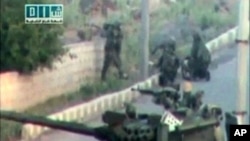The United States imposed sanctions Friday on Syria’s intelligence agency and two relatives of President Bashar al-Assad over the Damascus government’s bloody crackdown on democracy protestors. Officials say the penalties may be later be expanded to include the Syrian leader himself.
Obama administration officials acknowledge the sanctions, freezing any American assets and barring U.S. business dealings by the named individuals and entities, may have little immediate impact.
But they say they hope the action triggers similar steps by European allies, and puts world attention on those held responsible for the deaths of protestors in Syria, including the town of Daraa where scores of civilians have been killed by security forces.
The executive order, signed Friday by President Barack Obama, names Mahir al-Assad, the brother of the Syrian President and the commander of the Syrian Army’s 4th Division, which has played a lead role in operations in Daraa.
It also cites a cousin of President Assad, Atif Najib, who until recently was security chief in Daraa province, the Syrian General Intelligence Directorate and its chief, Ali Mamluk, as well as the elite Quds Force of Iran’s Revolutionary Guard Corps which is said to be providing "material support" for the Syrian crackdown.
Briefing reporters, State Department Policy Planning Director Jake Sullivan said those targeted are only "the first people on the list" who should face U.S. sanctions, and said the roster could be expanded to include President Assad himself if Syrian behavior does not change.
"The signal we’re trying to send with this order is that a series of individuals and organizations who have played a key role in perpetrating this violence should bear costs for doing so, and that the choice is imposed on others about what they do in the future," said Sullivan. "And if they continue this violence, and if they engage in this violence, we have the flexibility to add additional designations."
The sanctions were authorized under the 2004 Syria Accountability Act by the U.S. Congress, which already sharply limits U.S. trade with that country.
The Iranian Quds force also has been previously sanctioned by the United States. Sullivan, while declining details, said U.S. officials are sure this Tehran-based organization has had a role in the Syrian crackdown.
"I’m not in a position to get into specifics about the information we have on Iran’s involvement in supporting Syria’s effort to repress its own citizens. But we feel we can state with confidence, as the President has, and as [U.N.] Ambassador [Susan] Rice has, that that involvement is ongoing and is unacceptable."
While describing President Assad as a potential sanctions target, Sullivan declined under questioning to say that he has lost his legitimacy and said Assad's political future is for the Syrian people to decide.
At the same time, he said the recent actions of Damascus authorities "are neither those of a responsible government, nor those of a responsible member of the international community."
US Imposes New Sanctions Against Syria Over Crackdown














